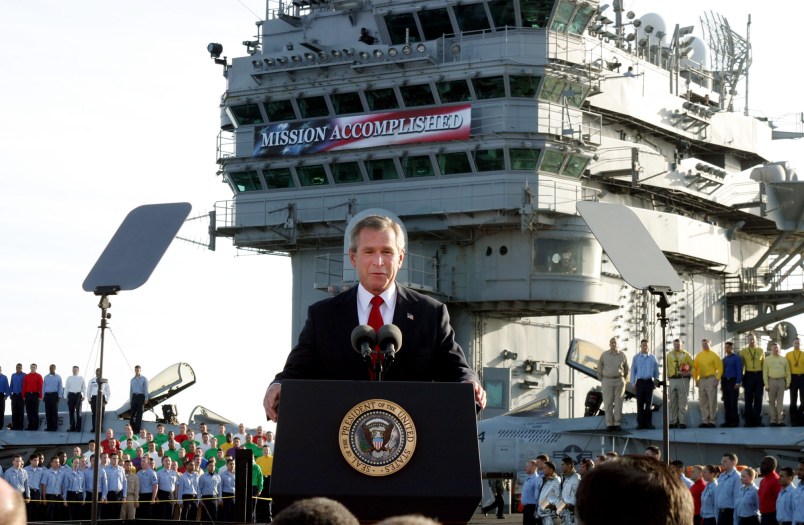The news that Fox News is accusing Donald Trump of “soft Trutherism” for stating the obvious fact that 9/11 happened on George W. Bush’s watch shows the depth of denial that still exists on this issue – especially on the right. For me, this issue is less that Bush is at fault as the fact that he somehow became the guy who “kept us safe” when the worst and to date only catastrophic terror attack on US soil happened on his watch.
I’m skeptical that Bush could have prevented the 9/11 attacks. In any case, that’s simply unknowable. There are a lot of people in the world and tracking down the ones who were plotting this crime would have been tough in any case. But that’s not the question. The question is whether he did everything he could have to prevent it. And there we have a lot of evidence, concrete evidence, that he didn’t.
This isn’t new information. It’s all stuff we learned, often in excruciating detail, a decade ago. And it’s not abstract or general. It’s specific things he and his team didn’t do, specific warnings they consciously ignored. Bush’s foreign policy trust simply didn’t take non-state terrorism very seriously. In traditional great power foreign policy terms, they were most focused on China before 9/11. And when it came to terrorism and the Middle East, they were focused on supposed state-sponsored terrorism from Iraq.
That is to say, they were focused on something that basically didn’t exist and were contemptuous or even mocking of people in the government – often people who held over from the Clinton administration – who believed the al Qaeda network was an immediate and pressing national security risk that needed to be addressed as a critical priority.
Of course, after the attacks, everything changed. Terrorism was the single and overriding and total issue everything got focused on. And yet, not everything changed. Terrorism became the organizing focus of US foreign policy. But Bush’s team still didn’t reconsider or dispose of the premise that real threats, by definition, were driven by states as opposed to non-state actors. That drove the effort to find the link between 9/11 and Iraq and finally the decision to manufacture the connection. It’s unquestionably true that there was an immense amount of bad faith – let’s say it, conscious deception and lying – involved in this. The Bush team came into wanting regime change in Iraq and when 9/11 happened that used it to push and eventually succeed at this original aim.
But it wasn’t only bad faith: there was this genuine misunderstanding of the early 21st century world, in which easy transportation, lightly regulated banking networks, communication technology and more allowed non-state actors to manage asymmetric attacks on a catastrophic scale.
Again, nothing new. These are facts we learned years ago in 2003 and 2004 and into 2005 – in a mix of journalism and government sponsored reports. But we learned them at a time when much of country and certainly the entirety of the Republican party was deep in the grip of the Bush 9/11 myth. Bush’s hold on the country only really started to loosen – his hold as arch protector – after these revelations were already old news. It was really only later in 2005 ’06 and ’07 that Bush’s numbers really started to crater, because of a series of scandals – the most important of which was the Katrina response – but overwhelmingly by the unfolding disaster in Iraq. It was because of that, I think, that we still have a lot of this collective denial. The country hasn’t reviewed this evidence, been forced to grapple with this evidence, out of under the Bush spell. That’s how Jeb Bush could, with a straight face, say that at least his brother “kept us safe” when, at least by this not altogether fair standard, he’s the only President in US history who’s allowed something that bad to happen on his watch.
Trump says tons of moronic stuff. But this is bluntly stated truth. 9/11 didn’t just happen on Bush’s watch. What we learned after the event showed that he didn’t do all he could have and should have done to prevent it. This is no abstract point. They were warned of the threat in contract and actionable ways and they ignored it because they didn’t buy that non-state-terrorism could be that big a threat.






